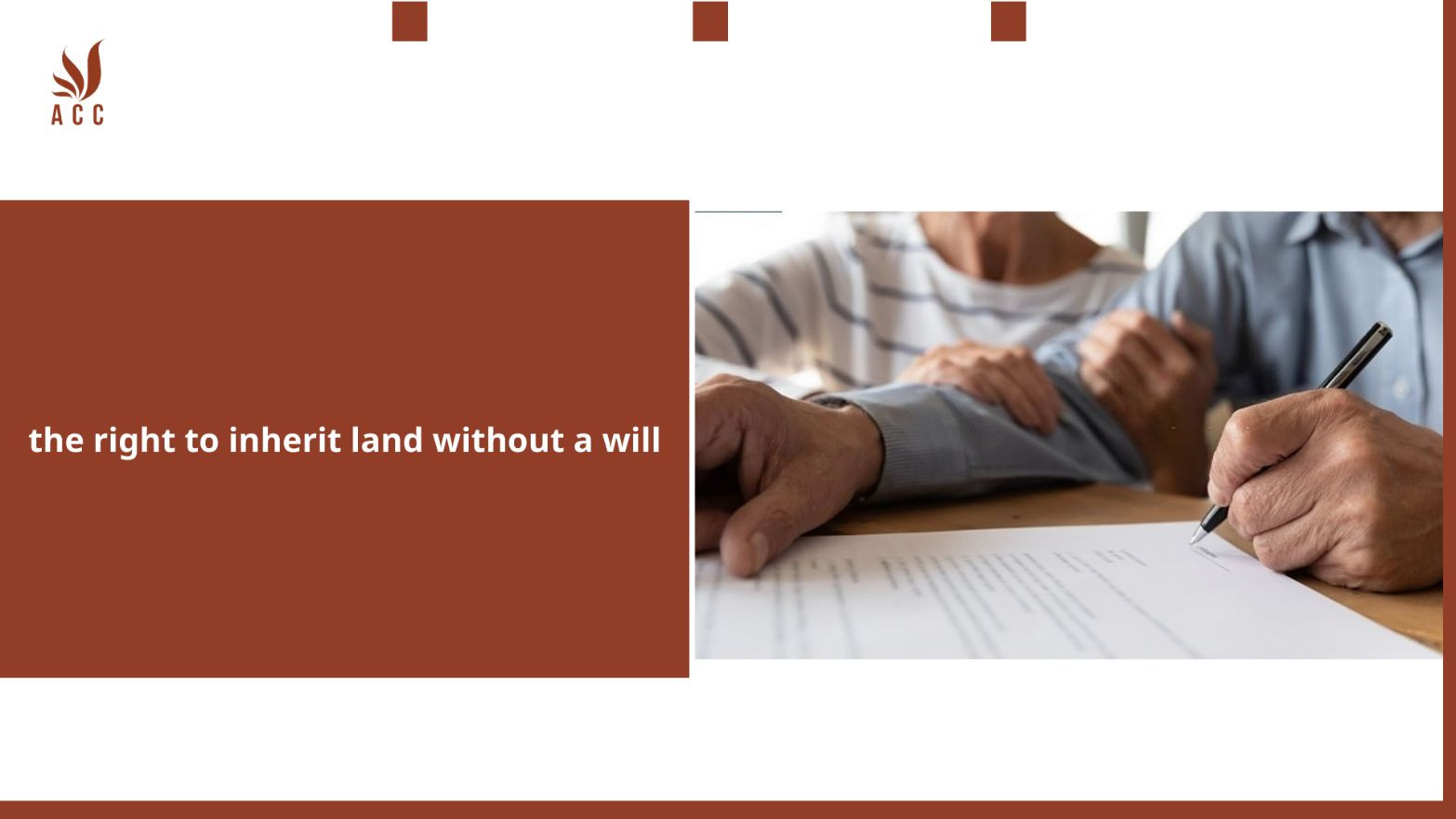The right to inherit land without a will is determined by the laws of intestate succession, which come into play when a person passes away without a valid will (intestate). Intestate succession laws vary by jurisdiction, but they generally dictate how a person's property, including land, will be inherited in the absence of specific instructions provided in a will. Here's a general overview of how the right to inherit land without a will works:

1. Identifying Legal Heirs:
The first step is to identify the legal heirs or beneficiaries who are entitled to inherit the land. Common categories of heirs typically include surviving spouses, children, parents, siblings, and sometimes more distant relatives, depending on the jurisdiction's laws.
2. Surviving Spouse's Share:
In many jurisdictions, the surviving spouse has a legal right to inherit a portion of the deceased's estate, including land. The exact share that the surviving spouse receives can vary widely, and in some cases, the surviving spouse may inherit the entire estate if there are no surviving children or other close relatives.
3. Distribution to Children:
If the deceased had children, they typically inherit a share of the estate, including any land. The distribution among children is usually equal, but specific rules may vary by jurisdiction.
4. Parents and Siblings:
If there are no surviving spouse or children, the estate may pass to the deceased's parents or, if they are no longer alive, to siblings or other close relatives, depending on the laws of the state or country.
5. Equalization Clause:
To ensure fairness and equality in the distribution, intestacy laws may include provisions for an equalization clause, allowing for adjustments in shares to achieve an equitable division of assets.
6. Debts and Expenses:
Before distributing any assets, the estate's debts, including funeral expenses, taxes, and outstanding bills, are paid off from the estate's funds.
7. Probate Process:
The process of distributing the estate, including land, typically involves a legal procedure known as probate. During probate, the court oversees the settlement of debts, payment of taxes, and the fair distribution of assets among the legal heirs.
8. Confirmation of Heirship:
To legally transfer ownership of land to the heirs, the court or relevant authority will confirm the heirship and update property records to reflect the new ownership.
It's important to note that the specific rules for intestate succession, as well as the shares of heirs, can vary significantly by jurisdiction. Local laws and customs play a significant role in determining how land and other assets are distributed when there is no valid will.
9. Q&A
Q1: If someone dies without a will, who has the right to inherit land?
A1: When a person dies without a will, the distribution of their land and other assets will be determined by the laws of intestacy in the jurisdiction where the property is located. Typically, the closest relatives, such as a spouse, children, parents, or siblings, have priority in inheriting the land. The specific rules and order of priority may vary depending on the jurisdiction.
Q2: Can someone who is not a relative inherit land if there is no will?
A2: In general, the laws of intestacy prioritize blood relatives in the distribution of land when there is no will. However, there may be exceptions or provisions in the law that allow for non-relatives to inherit land in certain circumstances. For example, if there is evidence of a legal agreement, joint ownership, or beneficiary designations, a non-relative may have a claim to the land. It is advisable to consult with a lawyer to understand the specific laws in your jurisdiction and any possible legal avenues for non-relatives to claim land.
Q3: Can a spouse automatically inherit land if there is no will?
A3: In many jurisdictions, a surviving spouse is entitled to a portion of the deceased spouse's estate, which may include land, even in the absence of a will. The specific share or percentage that a spouse is entitled to varies depending on the jurisdiction and other factors, such as whether there are children or other surviving relatives. It is important to consult with a lawyer to understand the spousal inheritance rights in your jurisdiction.
Q4: Can land be claimed by the government if there is no will and no heirs?
A4: In cases where a person dies without a will and no known heirs can be identified, the land may be subject to escheatment, which is the process by which unclaimed property reverts to the government. The specific laws regarding escheatment vary by jurisdiction, and the government typically has procedures in place to attempt to locate any potential heirs before claiming the property. It is advisable to consult with a lawyer to understand the laws regarding escheatment and the steps that may be taken to prevent the government from claiming the land.
Nội dung bài viết:






Bình luận